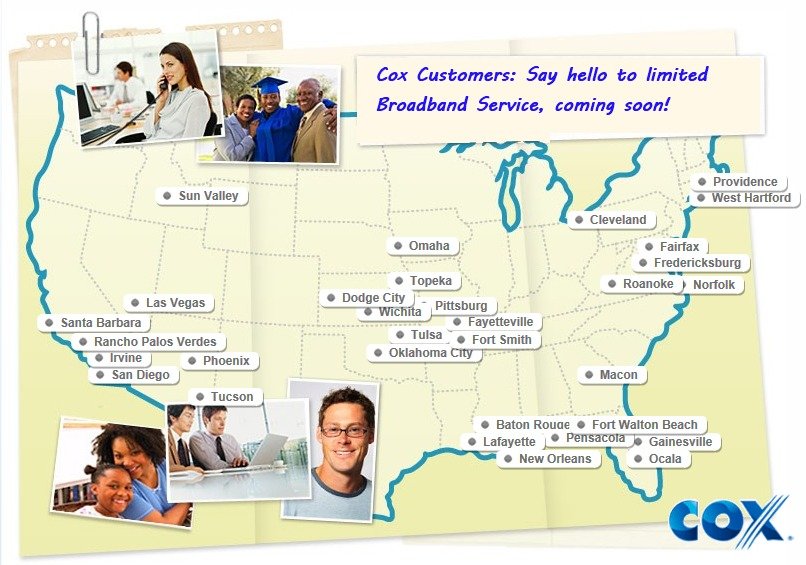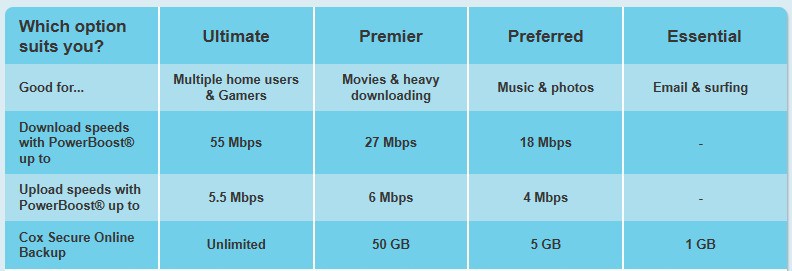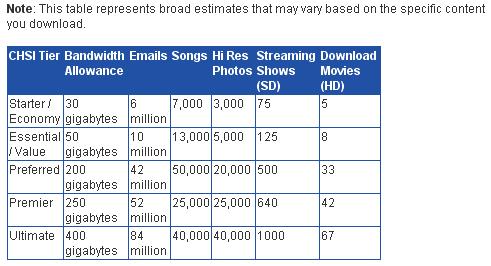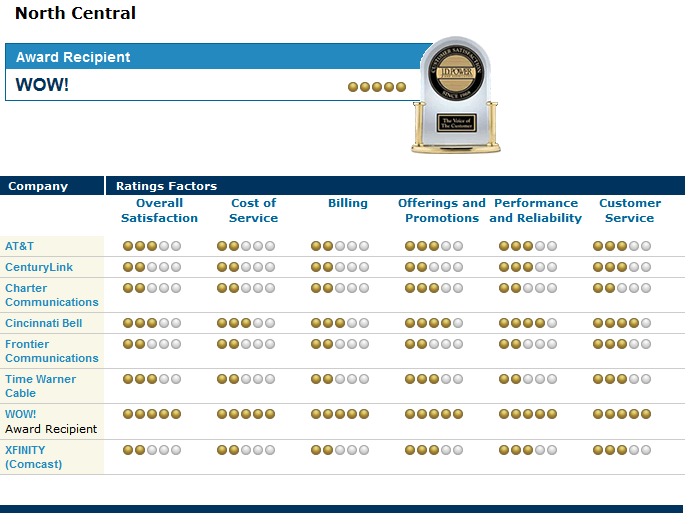Cox Cable customers in several states have been receiving e-mails announcing the availability of the company’s “Data Usage Meter,” which is generally a precursor to the implementation of an Internet Overcharging scheme. For at least two families, ignoring that usage meter temporarily shut down their Internet access when they reportedly exceeded their allowance.

Our view of what Internet Overcharging with usage caps really means.
Dear Cox High Speed Internet Customer,
We’d like to take this opportunity to announce the availability of the Data Usage Meter. This new feature provides an easy way to check monthly household high-speed Internet data usage at any time. Monthly data usage is the amount of data that users send, receive, download or upload each month for movies and videos, photos, web surfing, email, gaming, and other files.
Each of our packages has a specific data usage amount. The amount depends on your Cox High Speed Internet package and corresponds to the speeds provided with the package. Our speediest package provides the highest usage amount. You are currently subscribed to the Premier Package which has a monthly data usage amount of 250 Gigabytes (GB). This is equivalent to streaming about 138 standard definition movies, or 83 high definition movies in a month.
The vast majority of our customers do not exceed their usage amount in a month and Cox does not charge you an additional fee if you exceed it. However, if you find that you are exceeding the usage amount for your package, you should check for the following potential causes:
An unsecured wireless home network. If your wireless router does not have security enabled, others outside your home may be using your Internet service. Cox provides a free tool to test the security of your home network. The Home Network Security Check can be accessed by logging into your account via myaccount.cox.net which will place you into Internet Tools. From there, simply select the Home Network tab
A computer virus. If your computer is infected with a virus, it may be transmitting large amounts of data without your knowledge. Cox strongly advocates Internet safety and security. That’s why we offer all of our High Speed Internet customers free security software that will help protect your computers. Cox Security Suite Powered by McAfee® will shield you from many viruses, spam, phishing and spyware. It even comes with parental controls.
To download your copy in just a few minutes, simply visit myaccount.cox.net and select the Security Suite tab in Internet Tools.
If after checking for these problems you find that you are still exceeding the usage amount, you may want to consider upgrading to another package that more closely matches your use of the service. Cox’s top High Speed Internet package includes 400 GB per month.
To view your current data usage, follow these easy steps:
1. Visit myaccount.cox.net
2. Sign in with your primary Cox username and password
3. Select the “Data Usage Allowance” tab on the left bar
The Data Usage Meter shows daily and monthly usage for your account starting with the beginning of your billing period. The monthly view shows the usage by month determined by the date of the end of your billing period. Over time, you will be able to see your household usage over the previous 12 months. The Data Usage Meter is only available to primary account users and secondary user accounts with billing access.

Cox usage caps fly in the face of some of the company's ancillary broadband products, one of which claims to offer "unlimited backups." It's not "unlimited" with a usage cap in place.
Cox customers have been technically under an Internet Overcharging scheme limiting usage for well over a year, but enforcement of those usage caps has traditionally been light, with only the most egregious users occasionally getting phone calls from the cable operator. Some Cox markets still do not have a functioning usage measurement tool.
But there is growing suspicion that may be about to change. Some Cox customers in Georgia, Arkansas, and Kansas report Cox is contacting them about Internet usage, and in one case in Georgia, shut off an account after the family exceeded their allowance by just 3GB.
“I was 3GB over my 200GB [allowance] and my Internet was temporarily suspended till I called Cox,” writes Stormside, a customer in Warner Robins, Georgia. “They had a ticket number on me and transferred me to [another] department. I was given the spiel about their policies saying they can suspend or cancel my Internet service if I continue to go over the cap.”
After promising to more closely monitor usage, the account was restored.

Cox says you can send 84 million e-mails with their Ultimate package.
Another customer in Pensacola, Fla. experienced the same thing.
“They disabled my Internet due to the cap, and I had to call to get it back up,” shares Compaq255 on the Cox Forum on Broadband Reports.
The usage caps Cox may increasingly enforce leaves customers with two options:
- Reduce usage to remain within usage allowances;
- Upgrade to a faster speed package, with a correspondingly larger allowance.
Stormside intends to do the former, Compaq255 the latter.
“I was going to upgrade to the higher package anyway,” Compaq255 says.
Many Cox customers have no idea the company limits their Internet usage, because the usage allowance is only disclosed in buried fine print contained within the company’s lengthy legalese–Acceptable Use Policy. For customers like Janet Handshire, a Cox customer in Alma, Ark., the first usage cap disclosure she noticed was in a company e-mail.
“Cox sends e-mail to us all of the time, mostly promoting their various services, but I noticed this one because of all of the text,” says Handshire. “I was surprised to discover we even had a usage cap with Cox, and I am completely uninterested in visiting their usage page all the time to figure out whether I am okay with them or not.”
Handshire says she already pays nearly $200 a month to Cox for their triple play package and can’t believe the company is now becoming stingy over Internet usage.
“I have five boys and a husband in this house,” she says. “I already keep track of all the bills and now I have to start tracking how much everyone around here is using the Internet? I don’t think so. They are treating this like it is a limited precious resource.”
“The one thing we’ve learned following the broadband story in this country is Internet access is already a cash cow for these companies, but they keep asking for more,” she says.
Current usage allowances with Cox range from 30GB a month for their “starter” package to 250GB a month for their Premier Package. An Ultimate package in some areas offers even faster speeds with a 400GB allowance, but it’s not available everywhere.



 The study measured customer satisfaction with both local and long distance telephone service in four regions throughout the United States. Five factors were examined to determine overall satisfaction: performance and reliability; cost of service; billing; offerings and promotions; and customer service.
The study measured customer satisfaction with both local and long distance telephone service in four regions throughout the United States. Five factors were examined to determine overall satisfaction: performance and reliability; cost of service; billing; offerings and promotions; and customer service.

 Subscribe
Subscribe


